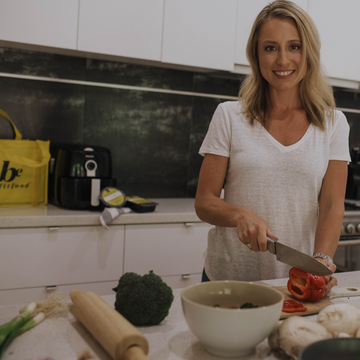Seasonal holiday parties are kicking in, and now weekends (everyday) are filled with socialising, wine and our absolute favourites: platter boards! Platters are delicious, but can often contain foods that are nutritionally poor, including processed meats, cheeses, dips, crackers and marinated foods. These foods are typically high in sodium and saturated fats and evidence shows us that an intake high in these is associated with weight gain, high blood pressure, and increased fatty substances in our blood including cholesterol and triglycerides which can all have negative health impacts.
Studies demonstrate snacking patterns can reflect unhealthy eating patterns such as mindless eating and overeating. This can impede weight loss progress. When we are drinking wine and snacking, we often consume more calories than we realise. Mindless eating is when you have an automatic and mindless nature of eating; it is without thinking. In this situation you have a glass of wine in one hand, the other hand is reaching for the platter board, and your mind is distracted with being a social butterfly. This is when we can easily overeat.
Here are some pointers on how you can indulge in platters without completing sabotaging your healthy diet.
Things to avoid:
- Processed/deli meats such as salami, twiggy sticks and kabana
- Soft cheeses (brie, camembert)
- Dried fruits
- Quince paste
- Bread and breadsticks
Keep to a limited/minimal amount:
- Hard cheeses (cheddar, blue)
- Wholegrain crackers and other savoury biscuits
- Most dips (cream cheese based or oily based)
- Stuffed bellpeppers, sundried tomatoes and other marinated vegetables
Enjoy guilt free:
- Celery sticks, carrot sticks and other low starch vegetables
- Olives
- Grapes and berries
- Nuts (almonds, cashews)
- Hummus
- Tzatziki
- Caviar
Some tips for healthier platters:
- Saturated fat and sodium are high in most deli meats and cheeses.
- Choose smoked salmon over processed meats.
- In regards to cheeses, try to go for cottage or ricotta cheese, or small amounts of hard cheese.
- Choose dips that are made with mostly vegetables or natural/Greek yoghurt rather than oily dips or dips made with a cream cheese base.
- Try wholegrain crackers as these will be higher in fibre and have a lower GI than non-wholegrain options.
- Try not to overeat. It is easy to overdo it with nibbles so monitor the amount you are eating and stay tuned in with your fullness cues.
- We often see dip platters as ‘snacks’, but we can usually get enough calories from platters for it to count as a whole meal. Consider this when you are enjoying a platter. You could make a conscious decision to enjoy this rather than eating a ‘proper meal’.
Platters are an enjoyable aspect of social occasions . They are rarely going to meet what we see as a perfect healthy meal with the right proportions of protein, carbohydrates and fat. Instead, enjoy the healthier options that are provided and eat in moderation. Try to eat healthy, wholesome and nutritionally balanced meals for the rest of the day. We also believe in the compensation theory; go for an extra walk to compensate for the indulgence. Taking this approach means you will only be straying away from your usual healthy diet for one meal of the day, rather than writing off a whole day!
Watch this video for some quick and easy platter suggestions. Enjoy!
References:
Aburto N, Ziolkovska A, Hooper L, Elliott P, Cappuccio FP, Meerpohl JJ. Effect of lower sodium intake on health: systematic review and meta-analyses. BMJ. 2013;346(1):326.
Kong A, Beresford S, Alfano C, Foster-Schubert, Neuhouser M, Johnson D. Associations between snacking and weight loss and nutrient intake among postmenopausal overweight-to-obese women in a dietary weight loss intervention. J Am Diet Assoc. 2011;111(12):1898-1903.
Ogden J, Coop N, Cousins C, Crump R, Field L, Hughes S et al. Distraction, the desire to eat and food intake towards an expanded model of mindless eating. Appetite. 2013;62:119-126.
Sparks E, Farrand C, Santos JA, McKenzie B, Trieu Kreimers J et al. Sodium levels of processed meat in Australia: supermarket survey data from 2010 to 2017. Nutrients. 2018;10(11).
Vergnaud A, Norat T, Romaguera D, Mouw T, May A, Travier N. Meat consumption and prospective weight change in participants of the EPIC- PANACEA study. Am J Clin Nutr. 2010;92(2):398-407.









